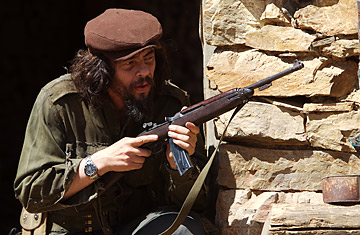
Benicio Del Toro in CHE.
(2 of 2)
Like Ridley Scott's Black Hawk Down, this is a war movie that spends virtually all its time at war, showing how soldiers fight and die. Che's depiction of guerrilla war tactics is so minutely detailed, it could provide an illuminating education to West Point cadets, or Taliban recruits. With about 80% of the two-part picture taking place in the Cuban or Bolivian jungle, it's the woodsiest war movie ever, and not so much a long march as the daily log of a sylvan slog.
The first half of Che unreels as inspirational history, the second half unravels as tragedy. Part 2 is essentially a remake of Part 1, with many scenes repeated. Guevara has to instill military discipline in his ragtag rebels in Cuba, then in Bolivia. In both places he has to decide whether to accept underage volunteers. In both, he gives his men a chance to quit before the decisive battles, where they are fired on by unseen regular soldiers and suffer the deaths of friends who've made their big speech or sentimental impression moments before. The film suggests that any war is hell — the same kind of hell — and that a war movie should be like a real tour of duty: uncomfortable, monotonous (except when interrupted by combat) and way too long, with the draftees aching to achieve their goal or go home.
All this is an earnest of Soderbergh's doggedly naturalistic, antidramatic approach here, which is admirable but enervating. The conflicts are almost entirely between Che and his men, between the platoon and their forest environment. Spending up to a year in the jungles of either Cuba or Bolivia, the soldiers seem trapped in some tropical Blair Witch Project, stripped of the scary bits. And forgive me for asking, but with all these young men separated from their girlfriends for such a long time, why (with one rapacious exception) do they never express any interest in women? The movie lets you infer that they're bearded Boy Scouts, or celibate monks with guns.
Occasionally, the film is enlivened by the guest appearances of familiar actors, sometimes cast appropriately (Lou Diamond Phillips as Mario Monje, Catalina Sandina Moreno as Che's second wife), sometimes not (Matt Damon as a priest-negotiator in Bolivia!?). But the major burden falls on its star, who nurtured the project for almost a decade. And Del Toro — whose acting style often starts over the top and soars from there, like a hang-glider leaping from a skyscraper roof, thinking there's nowhere to go but up — is muted, yielding few emotional revelations, seemingly sedated here. Except for one pungent confrontation at the UN between Guevara and ambassadors from other Latin American countries, Che is defined less by his rigorous fighting skills and seductive intellect than by his asthma.
The dyspepsia of Del Toro's performance is partly due to the bromides he has to enunciate — that the most important quality of a revolutionary is "love," and that he's not a Catholic but "I believe in mankind" — and partly because so little information is vouchsafed about his non-jungle career or his private life. (You're about 100 mins. into Part 1 before Che mentions in passing that he has a wife and child back home.) Halfway through the film he has lost much of the majesty and poignance you might expect of such a character, and by the end he's relinquished his grasp on the moviegoer's interest. After all that time spent with the revolutionary leader, viewers still may ask, "So, who is this guy?"
As Roger Ebert put it: "No attempt is made to get inside the mind of this complex man, Guevara. We are told he was a medical student, suffered from asthma, was more ruthless than Castro, was the real brain behind the operation. Big deal. ... When we aren't getting newsreels, we're getting routine footage of guerrilla clashes in the jungle. ... All this movie inspires toward the Cuban Revolution is excruciating boredom..."
Ebert wrote this in 1969, in a review of the flop Hollywood bio-pic Che!, with the not-very-Latin Omar Sharif as Guevara. Yet most of Ebert's denunciations apply to Soderbergh's movie, which dispenses with the exclamation point — and with almost all of the compelling, sometimes contradictory drama in Che Guevara's life.
In the end, the Cuban newspaper was nearly right: it's not the Castro character but the whole of this grand, doomed experiment that lacks "charisma and depth."
